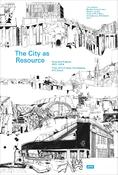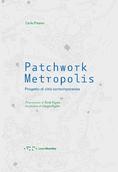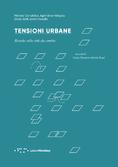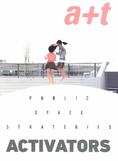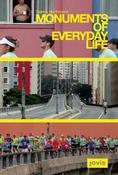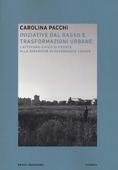simulation immigration social capital urban form open spaces inclusive processes habitability mega-events historic centers sociology urban theory participation giornata di studi inu paesaggio sprawl tools and techniques open position urban market local development ricerca landscape history maps periodic news digitalization
The City as Resource
Edited by Tim Rieniets, Nicolas Kretschmann, Myriam Perret; Chair of Prof. Kees Christiaanse, ETH Zurich
pp. 248, 2018 | ISBN 978-3-86859-1
Resources are the stuff of which the future is made. The city itself is a resource, as it opens up a wide range of possibilities for every individual and for society as a whole. The city is not an inexhaustible resource, however. Only if it is used in a sustainable way and if it does not solely serve short-term, isolated interests, can it also fulfill the needs of future generations. The biggest challenge for contemporary urban design is, therefore, to plan the city itself as a regenerative cycle, not only in terms of shaping its spatial and aesthetic qualities, but also in relation to its development over time.
Using articles, student projects, and examples, this book presents methods and strategies for designing the city as a resource; it thus lends a new meaning to the idea of sustainable building.
TABLE OF CONTENTS
• Preface | 7
Kees Christiaanse
• The City as Resource. An Introduction | 9
Tim Rieniets
• Situations
About Exploring, Depicting, and Changing Urban Spaces | 25
Benedikt Boucsein
• Depicting
Photography as a Means for Identification of Urban Potentials: A Project in Zurich | 35
Foto Project
• Mapping
Deficits and Potentials of Cartographic Representations of
Urban Spaces | 47
Tim Rieniets
• Images of the City
Photographic Observation, Analysis, and Projection of
Urban Qualities | 61
Michael Wagner
• Realms of Opportunity
Designing for an Open Future | 73
Christian Salewski
• Designing Openness
Urban Design Options for the Re-use of an Airfield:
A Project in Dübendorf | 83
Urban Design Studio
• Imagination
Images as Means for Design and Communication | 95
Thomas Kovári
• Narration
Storytelling as an Urban Design Tool | 103
Simon Kretz
• Alternative Urban Practices
Production of Space beyond State and Market | 115
Anne Mikoleit
• Valorization
Planning of Urban Value Constellations | 125
Daniel Kiss
• Designing Resilience
The Combination of Stability and Flexibility as Resource: A Project in Belgrade | 135
Urban Design Studio
• Re-use
From Exception to Normality: Re-use in Urban Development | 145
Martina Baum
• Reinterpreting
Urban Design Strategies for Valorizing a Large-scale Housing Complex: A Project in Perm | 155
Urban Design Studio
• Urbanity of Things
Relationship Potential and Wealth of Relations as Urban Resource | 167
Simon Kretz
Christian Salewski
• Space for Encounters
Publicly Used Spaces as the Connection within the City | 181
Tim Rieniets
• Reorganization
New Urban Qualities in Existing Structures: A Project in Rotterdam | 193
Urban Design Studio
• Parcellation and Transformation
Significance of the City Layout for the Adaptibility of
Urban Structures | 199
Christian Salewski
• Enablement
Strategy as a Means of Enabling Private Building Ventures: A Project in Istanbul | 211
Urban Design Studio
• Create
Resistance Breeding Grounds for Urban Developments: A Project in Chengdu Biographies Picture | 223
Urban Design Studio
• Biographies | 237
• Picture Credits | 242
• Bibliography | 245
ABOUT THE EDITORS
• Prof. Kees Christiaanse studied architecture and urban planning at the TU Delft. From 1980 until 1989, he worked for the Office of Metropolitan Architecture (OMA ) in Rotterdam, becoming a partner in 1983.
• Tim Rieniets studied Architecture in Braunschweig, Delft, and Berlin. He has focused on research, communication, and the public presentation of current trends in urban development and building culture.
• Nicolas Kretschmann is an architect and urban designer. He studied at the Technical University of Berlin, the University of Genoa, and the ETH Zurich and worked for David Chipperfield Architects in Berlin and KCAP Architects & Planners in Rotterdam and Zurich.
• Myriam Perret is an architect, urbanist, and researcher. She studied at the Swiss Federal Instituts of Technology Zurich (ETHZ ) and Lausanne (EPFL).
Related articles:
-
Patchwork Metropolis
Progetto di città contemporanea -
Tensioni urbane
Ricerche sulla città che cambia - a+t 51 ACTIVATORS
-
Monuments of Everyday Life Interplays of City, Infrastructure,
and Architecture in São Paulo -
Iniziative dal basso
e trasformazioni urbane
L'attivismo civico di fronte alle dinamiche di governance locale




Planum
The Journal of Urbanism
ISSN 1723-0993
owned by
Istituto Nazionale di Urbanistica
published by
Planum Association
ISSN 1723-0993 | Registered at Court of Rome 4/12/2001, num. 514/2001
Web site realized by ChannelWeb & Planum Association | Powered by BEdita 3
